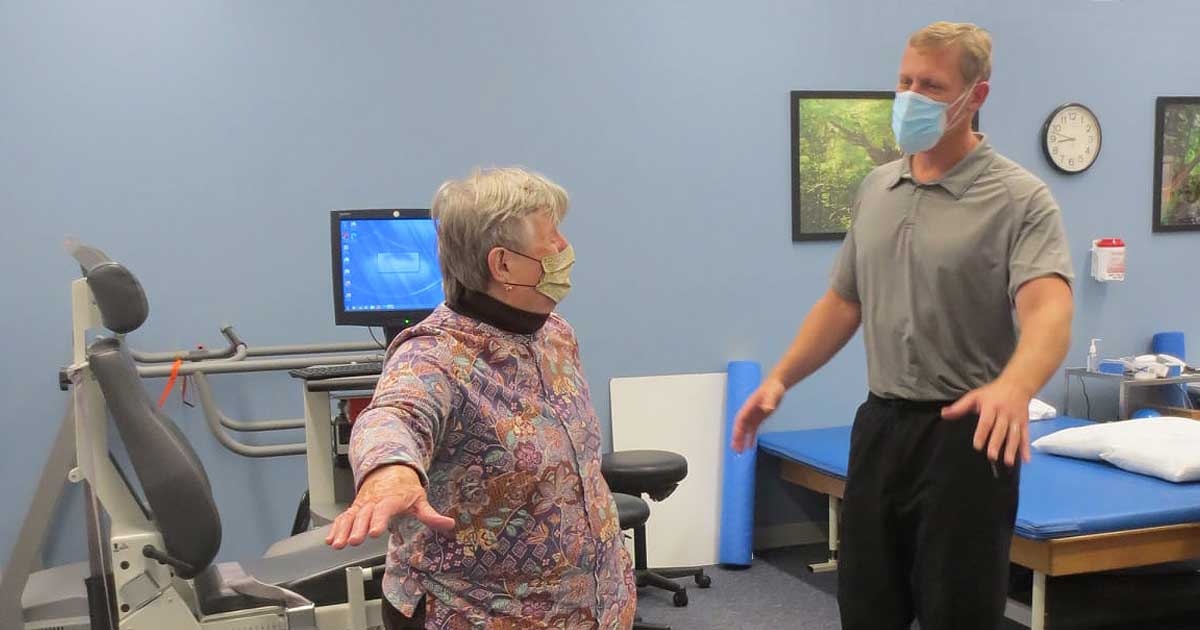Have you ever woken up only to find your head spinning and the sound entering your ears is like someone talking through a tin can? Or have you turned your head and started to feel extremely light-headed, even to the point you’re afraid you might pass out? You’re not alone.
Vestibular Rehabilitation Therapy (VRT) is an exercise-based treatment program designed to promote vestibular adaptation and substitution. The word vestibular refers to a part of the inner ear or, more specifically, to your sense of balance. In other words, if you suffer from vertigo, dizziness, light-headedness, or imbalance, Vestibular Therapy can probably help you.
The two most common diagnoses Vestibular Therapy can help with are benign positional paroxysmal vertigo (BPPV) and vestibular neuritis.
At McLean we have been successfully treating issues like this for over 20 years. We have a specialist on staff. According to Eric Tharaldson, Physical Therapist for McLean Outpatient Rehabilitation, “BPPV occurs when tiny calcium crystals called otoconia come loose from their normal location in the inner ear. Someone with BPPV will typically report short intense spells of vertigo lasting seconds. Vertigo occurs with changes in head positions. Bending over, getting in or out of bed and rolling over are just a couple of common positional changes that can cause vertigo. Vestibular neuritis is caused by an inner ear visual infection. The initial onset of vertigo in this case is much longer and can last for several hours. It’s usually accompanied by nausea and imbalance.”
According to Eric, it’s important to note, “vertigo is a symptom, not a condition or diagnosis. Vertigo can be caused by different medical disorders including head or neck injury, Vestibular neuritis or Meniere’s disease, a disorder of the inner ear that can lead to dizzy spells, vertigo and hearing loss. In most cases, Meniere’s disease affects only one ear. Vertigo is a sensation where it feels like the environment is moving around you. A person will typically describe the sensation as feeling like they’re spinning.”
One senior suffering vertigo after a serious concussion says, “It’s an incredibly strange sensation. One moment you feel fine, then you look up and suddenly your world blurs, and you feel completely disoriented. If you’re standing, it feels like you’re falling into the abyss. If you’re sitting down when it happens, the desire is just to lay down and close your eyes, and hope the feeling passes quickly.”
So, who can benefit from vestibular therapy? According to Eric, “Anyone with dizziness or difficulty maintaining balance. Someone with trouble maintaining balance or experiencing dizziness may be at a higher risk of developing a fear of falling and adapt a more sedentary lifestyle. Our vestibular function declines just as our strength and balance does with inactivity. Vestibular Therapy can help with building all necessary components of balance including vestibular function, allowing a person to return to a more active lifestyle.”
If you’re experiencing vertigo, dizziness or any of the other associated symptoms, Eric suggests the first thing to do is talk to your primary care physician (PCP). “Your doctor can do an inner ear evaluation and refer you to the appropriate specialists. The sooner you get treatment for any balance problem, especially one that may be caused by an inner ear disorder, the better.”
Your PCP can refer you to the McLean Outpatient Therapy clinic for Vestibular Therapy. Our well-trained staff has more than 20 years of clinical experience treating individuals with vestibular disorders. You will receive a complete evaluation of your disorder, after which an individualized plan of care will be set up for you. With that level of knowledge, care and experience, you can feel confident you’ll receive the care you need to get you back on your feet quickly.


